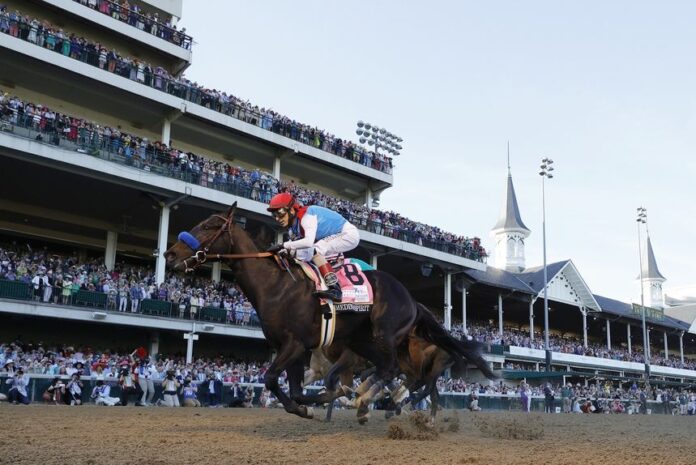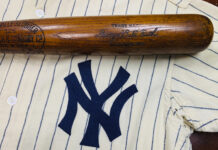The Kentucky Derby is a race that is available only to three-year-olds. Young horses prepare for the race, the winner emerges with a well-deserved reputation boost, and if the fans are lucky, they will see the horse race for another year or so.
But what happens then? What happens to the Derby winners after they run their last race?
Naturally, most of them retire to the breeding shed. However, that can mean a lot of different things depending on the horse’s bloodlines and prowess as a sire.
As of this writing, there are nineteen former Kentucky Derby winners living in retirement, and they have a variety of different circumstances.
Kentucky-Based Stallions
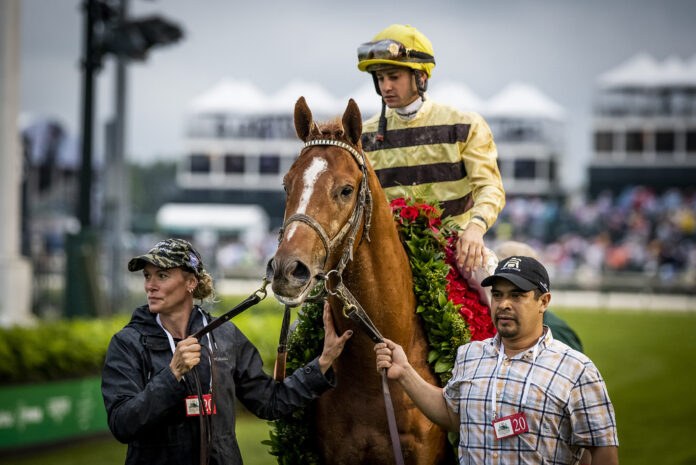
Most young Kentucky Derby victors, particularly those with additional qualifications and appealing bloodlines, begin their stud careers in Kentucky. The six youngest retired Kentucky Derby winners (Authentic, Country House, Justify, Always Dreaming, Nyquist, and American Pharoah) all stand at farms in Kentucky, with fees ranging from $5000 per live foal to $100,000 per live foal.
Many breeders are willing to support an unproven Kentucky Derby winner at stud, particularly since hot new sires draw a lot of attention at public auction, and it certainly does not hurt that two of these young sires, Justify and American Pharoah, are full Triple Crown winners from families that have a history of breeding on well. To learn more about Justify, the last Triple Crown winner, you can check out this TwinSpires article about Justify horse.
However, once the first few crops come to the races, even a Kentucky Derby winner has to fight to keep his position. Only one Derby winner older than American Pharoah has managed to remain in Kentucky: Street Sense, who stands at Darley America for a $70,000 fee. Street Sense has been a consistent producer of good runners, and his appeal at stud is based on his produce record more than Kentucky Derby name recognition. Street Sense’s recent top-level performers include grade I stakes winners Maxfield, McKinzie, and Speaker’s Corner.
Regional Stallions
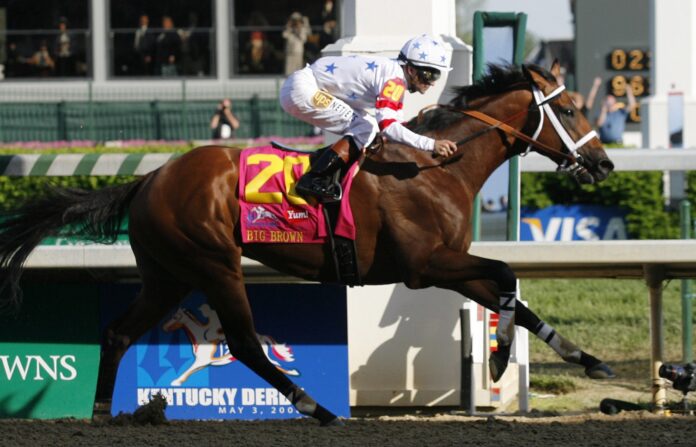
Many older Kentucky Derby winners who fail to draw consistent attention from breeders in Kentucky are sent to other parts of the United States. These stallions may not influence the breed on a national scale, but they can do a lot to improve the Thoroughbred industry in other states.
I’ll Have Another stands for a fee of $10,000 per live foal at Ocean Breeze Stud in California. Initially standing in Japan, I’ll Have Another sired grade III stakes winner Another Truth (JPN). His first American offspring are just coming to the races as two-year-olds of 2024.
The 2008 Kentucky Derby winner, Big Brown, stands at Irish Hill and Dutchess Views Stallions in New York for a $5000 fee. His progeny include graded stakes winners Dortmund and Somelikeithotbrown.
The surprise 2005 Derby winner, Giacomo, stands at Oakcrest Equine in Oregon for a $1500 fee. For many years, he stood alongside 1996 Kentucky Derby winner Grindstone. He is the sire of grade I stakes winner My Pleasure.
Finally, the immensely popular Smarty Jones returned to his home state of Pennsylvania, where he stands at Equistar Farm for $3500. His most successful progeny include graded stakes winners Backtalk, Rogue Romance, and Cary Street.
International Stallions
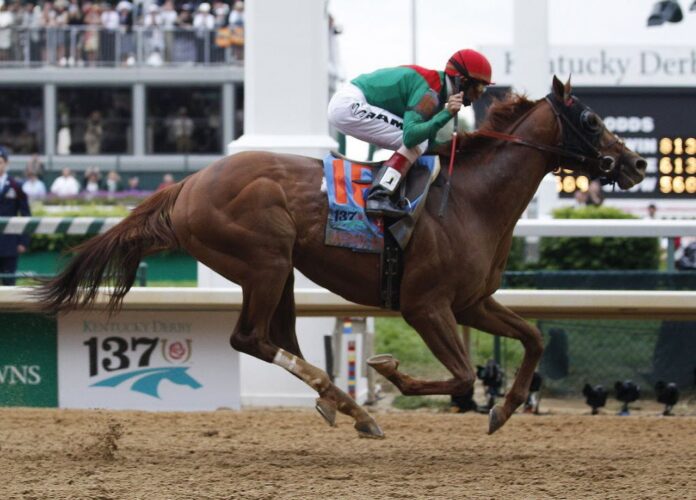
Some stallions who do not appeal to Kentucky breeders are purchased by breeding farms in other countries, a practice which gained steam after 1989 Kentucky Derby winner Sunday Silence went to Japan and ended up completely revolutionizing the Japanese breeding industry. This provides stallions who might otherwise be ignored with opportunities to breed to quality mares with international pedigrees.
California Chrome and Animal Kingdom both stand at stud in Japan. California Chrome stands at Arrow Stud for 4 million yen (approximately $29,790), while Animal Kingdom stands at Shizunai Stallion Station for 1.2 million yen (approximately $8938). Both stallions’ first Japanese crops are yearlings of 2024.
Super Saver recently went to the Jockey Club of Turkey, where he stands for a fee of 12,500 euros (approximately $13,143). His first Turkish foals were born this year.
2013 Kentucky Derby winner Orb has stood most of his career in Kentucky, but was sold to Uruguay in 2024. He stood his first season at his new home, Haras Cuatro Piedras, that summer, as the Southern Hemisphere breeding season begins in July. His first Uruguay folas are expected soon.
Proud Pensioners
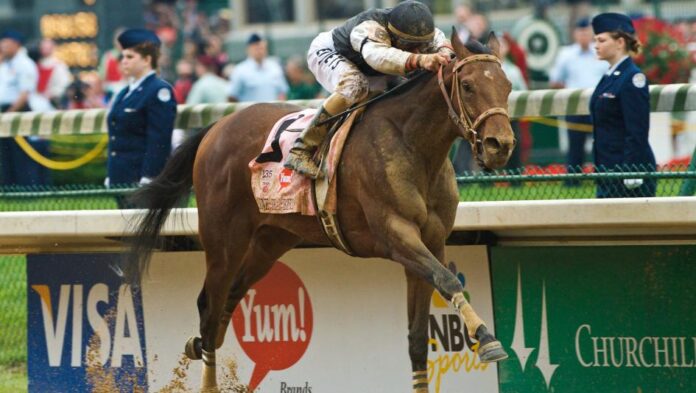
While retirement for a champion racehorse generally refers to the breeding shed, four Derby winners are retired in a truer sense of the word: the winning geldings Mine That Bird and Funny Cide, and the two oldest living Derby winners, Fusaichi Pegasus and Silver Charm.
While Mine That Bird continues with the duties of a ranch horse, the other three, who are well into their twenties, live lives of ease, stopping only to meet the occasional fan. Fusaichi Pegasus is pensioned at Ashford Stud, where he stood as a stallion for most of his career; Silver Charm and Funny Cide are popular residents at Old Friends and the Kentucky Horse Park, respectively.
Although these nineteen living legends have one marvelous feat in common, their lives after racing have diverged pretty drastically. There are many options available for Kentucky Derby winners, and all have the opportunity to live good lives getting the adoration they are due.
Final Thoughts
As you can conclude from this article, most Kentucky Derby winners after the victory are worth a lot of money. Not only do they enjoy a comfortable retirement, but they get to sire horses that usually are raised to also become competitors and win races.
One example is Forbidden Kingdom, that has already some competition wins up his sleeve and is the son of American Pharoah.
Therefore, we can understand even better the magnitude of the Kentucky Derby that goes way beyond the race itself and adds an endless legacy to the horse, the jockey, the trainer and the owner. Rich Strike, the winner of this year’s Derby, who won on 80-1 odds, will probably see his value more than triplicate after that victory, even if he does not go on to win any other major races in the future.

